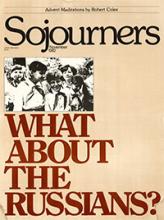Like most Russian believers, I am an Orthodox Christian. Though I am a U.S. citizen, I have work that takes me, to Russia for about a month at a time. I speak Russian. Thus in Moscow and Leningrad, Kiev and Kishinev, Odessa and Kazan, I have passed as a Russian Christian, taking the sacraments in churches, and shared regular fellowship with believers.
I have never been a part of any official religious delegation. My friendships are with laypeople in the Orthodox Church, whom I see unescorted. I know a few Catholics in Leningrad and the Baltic republics, but I have never met any of the Baptist or evangelical minority. Despite sporadic media attention to the problems of Christianity in Russia, I am troubled that Americans know so little of Russian Christians. It is not right that our brothers and sisters in the Soviet Union should be faceless. They deserve to have us see, briefly, a small slice of their spirit.
The church is everywhere in the Soviet Union. Let me assure you that Christianity, especially in its Orthodox form, is pervasive in Russia. Many Russians identify themselves quite frankly as "believers," a term much more frequent than "Christian." They pray. If a working church is within commuting distance, they worship openly. If there is no church close by, they go to great trouble to find one.
Westerners can be blind to the Spirit in Russia because they do not recognize its Orthodox form. Believers and non-believers are not quite so incessantly polarized as we might suspect. The Russian grandmother babysitting in the park is likely to be a Christian and to teach her grandchildren the sign of the cross and basic prayers before they ever learn the official atheist line. Families often split along theological lines--a brother is a believer, an aunt belongs to the Party, a grandmother is piously observant (all too many of the grandfathers died in the war), yet a daughter is ignorant of religious matters but believes, somehow, in a God.
Read the Full Article

